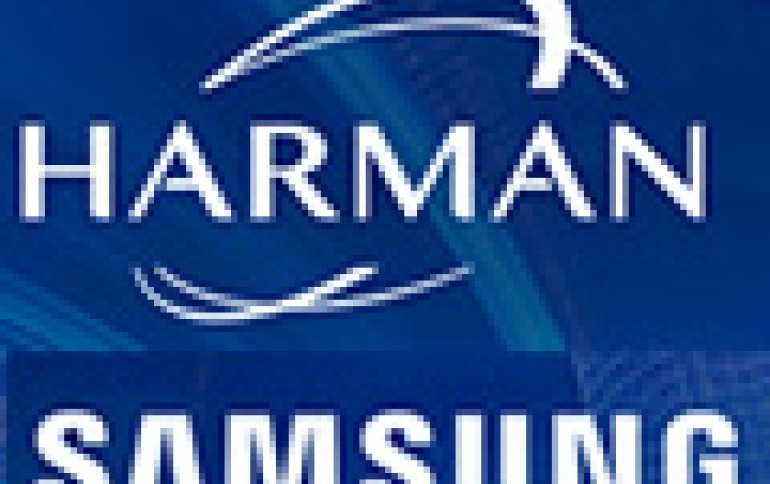
Samsung, Harman Outline Connected Car Vision
Samsung Electronics unveiled on Monday its vision to become the world leader in connected vehicles solutions, by combining its information technology with Harman International Industries' expertise in the smart car business.
The South Korean technology giant last week announced the acqusition of Harman for $8 billion.
Harman International Industries CEO Dinesh Paliwal, Samsung Electronics President and Chief Strategy Officer Sohn Young-kwon, and Vice President Park Jong-hwan gave a press conference in Seoul speaking about the synergies between the two companies.
"Future cars will be quite different from present ones. They may require much more user experiences," said Sohn Young-kwon, president and chief strategy officer at Samsung Electronics, in a press conference on MOnday . "In particular, connectivity will be more interactive, giving more user experiences in audio and video sectors through new applications."
Sohn said the company was keen to create more demand in the market by combining Samsung's advanced video technology with Harman's top-class audio systems. Harman is the world leader in the branded car audio systems market, owning JBL, Bang & Olufsen and Lexicon among others.
Samsung has also reaffirmed it has "no plans" to become an automaker.
"We made it very clear (to our automaker clients) that Samsung Electronics, by acquiring Harman, wants to become a primary smart mobility systems provider, rather than a carmaker," said Harman CEO Dinesh Paliwal.
"Harman has a very similar future plan with Samsung," he added. "Harman brings a very strong automotive portfolio, whereas Samsung offers expertise in such areas as sensors, displays, fifth-generation (5G) connectivity and mobility. The latest deal comes as we hope to combine these two elements from both firms and make smarter automotive systems."
"User experience is getting more important for the future autonomous vehicles industry," said Sohn, adding that both firms expect new products, converged from their respective expertise, will be unveiled in 2018 at the earliest.
"Convergence of technologies is not an overnight thing, so we believe the latest deal should be considered from a long-term viewpoint," he said. "For example, Harman's unique sound systems may contribute to our mobile business."
Samsung is turning to the connected cars business as it seeks for new cash sources in a dwindling global smartphone market. It is part of the group's strategy to focus on the next growth engines, which include its biopharmaceutical affiliate Samsung BioLogics.
Paliwal said that the acquisition will create synergies. "We bring very strong systems knowledge and echo systems. Samsung brings censor technology, IT technology, displays, 5G connectivity and mobility. When we combine those two, we have perfect solutions and smart mobility experience."
The deal could help Samsung expand its supply of semiconductors and display units on Harman's distribution channels, securing more stable revenues and earnings due to the longer product life cycle in the auto business.
Harman International Industries CEO Dinesh Paliwal, Samsung Electronics President and Chief Strategy Officer Sohn Young-kwon, and Vice President Park Jong-hwan gave a press conference in Seoul speaking about the synergies between the two companies.
"Future cars will be quite different from present ones. They may require much more user experiences," said Sohn Young-kwon, president and chief strategy officer at Samsung Electronics, in a press conference on MOnday . "In particular, connectivity will be more interactive, giving more user experiences in audio and video sectors through new applications."
Sohn said the company was keen to create more demand in the market by combining Samsung's advanced video technology with Harman's top-class audio systems. Harman is the world leader in the branded car audio systems market, owning JBL, Bang & Olufsen and Lexicon among others.
Samsung has also reaffirmed it has "no plans" to become an automaker.
"We made it very clear (to our automaker clients) that Samsung Electronics, by acquiring Harman, wants to become a primary smart mobility systems provider, rather than a carmaker," said Harman CEO Dinesh Paliwal.
"Harman has a very similar future plan with Samsung," he added. "Harman brings a very strong automotive portfolio, whereas Samsung offers expertise in such areas as sensors, displays, fifth-generation (5G) connectivity and mobility. The latest deal comes as we hope to combine these two elements from both firms and make smarter automotive systems."
"User experience is getting more important for the future autonomous vehicles industry," said Sohn, adding that both firms expect new products, converged from their respective expertise, will be unveiled in 2018 at the earliest.
"Convergence of technologies is not an overnight thing, so we believe the latest deal should be considered from a long-term viewpoint," he said. "For example, Harman's unique sound systems may contribute to our mobile business."
Samsung is turning to the connected cars business as it seeks for new cash sources in a dwindling global smartphone market. It is part of the group's strategy to focus on the next growth engines, which include its biopharmaceutical affiliate Samsung BioLogics.
Paliwal said that the acquisition will create synergies. "We bring very strong systems knowledge and echo systems. Samsung brings censor technology, IT technology, displays, 5G connectivity and mobility. When we combine those two, we have perfect solutions and smart mobility experience."
The deal could help Samsung expand its supply of semiconductors and display units on Harman's distribution channels, securing more stable revenues and earnings due to the longer product life cycle in the auto business.





















